Texas Holdem Rules

Exciting Texas Holdem is undoubtedly the most followed variation of poker, so it’s hard to come across a modern individual who has not heard of it. But, while that’s a source of pure entertainment and thrill for some, others, on the contrary, regard it as an integral part of their lifestyle and identity.
Professionals can generate a regular profit by playing for real funds. Just like in the realm of sports, this industry has its array of luminaries, such as Daniel Negreanu, Tom Dwan, Phil Hellmuth, and other renowned PROs. All of them started their card odyssey from the "dummy" level, meticulously honing their skills through gradual progression and dedication.
Your background and occupation do not matter at all. Whether you hold a Nobel Prize, impersonate Elon Musk, manage a team, or take care of your household, absolutely everyone can learn how to play poker. And if this is your goal, we are here to gladly assist you understand every aspect of the game.
Short Guide to Texas Holdem History
The Wild West and dashing cowboys engaged in intense card games within the walls of dusty saloons are what often come to one's mind when speaking about the origin of poker. Well, this is partly true, but the entertainment of choice during that era was Draw Poker.
The creation of the present-day version is normally credited to a certain T. "Blondie" Forbes. He was an itinerant poker player. The concept of “shared/common cards” emerged in 1920, which is a defining characteristic that sets this variety apart from the classic gameplay. And the city of Robstown in Texas is officially acknowledged as an inaugural venue where the discussed game was first played.
TH quickly burst into the hearts of gamblers and found a dedicated following. High-level sharks like Amarillo Slim, Johnny Moss, Doyle Brunson and others got involved in the game quickly. Hold’em perfectly combines skill and luck. It was a primary reason for it becoming the key format played at WSOP.

The origin of the Texas word in the game name is obvious. But the true origin of the second part remains a mystery. There is a theory that “Holdem” is an abbreviation for "Hold me Darling". It was a widely popular poker variation in the 1850s.
Unveiling Pivotal Betting Structures
Bets are the core of each card game type, including Hold’em and its cousin Omaha Poker. The only distinction between the types lies in the sums of money one can wager. Here it is important to understand how betting rules work before you join a table.
| Type | Explanation |
|---|---|
| No limit or NL | The game doesn’t limit the maximum size of the bet. Players can raise or bet any amount of chips affordable to them. |
| Pot-limit or PL | The largest amount to raise is equal to the point size at the current moment of the game. |
| Fixed-limit or FL | The sums of bets and raises are fixed and are usually limited to 4 raises per round. |
Particular emphasis in the article is placed on NL Holdem, cause this is the most sought-after version. In NL, one can raise the bet as much as they want, with no limitations existing. Thus, the most massive pots can be built here.

The key matter is in the number of cards. Omaha players get a total of 4 personal cards, rather than just 2 in Hold’em. They must then create a 5-card combo out of the 9 cards available. The combo is formed of two starters and 3 elements from the board.
Our Guide On How to Play Texas Holdem Poker
The maximum number of seats can’t exceed 10. This type of table is customarily called a "full ring", but there are alternatives:
- heads-up (one-on-one match);
- 3;
- 6;
- 8;
- 9.
Your primary goal is to take the entire pot formed during the current hand, getting as many chips as possible.
In Hold'em, each and every one of the gamblers is dealt two cards and nobody sees them, except the holder. They must be combined with the board elements to collect the best possible combo in case of a showdown. Note that you won’t always see all five community cards. Throughout betting rounds (often referred to as "streets"), you can show aggression and bluff to finish faster. The following betting rounds exist in the game:
- preflop
- flop
- turn
- river
Positions
The starting position plays a big role in how you perform at the very beginning. This knowledge is vital for selecting the appropriate game strategy. In Hold’em, the players’ seats can be divided into the following groups:
- early;
- middle;
- late.
Let’s consider seats using a table with 10 players as an example:
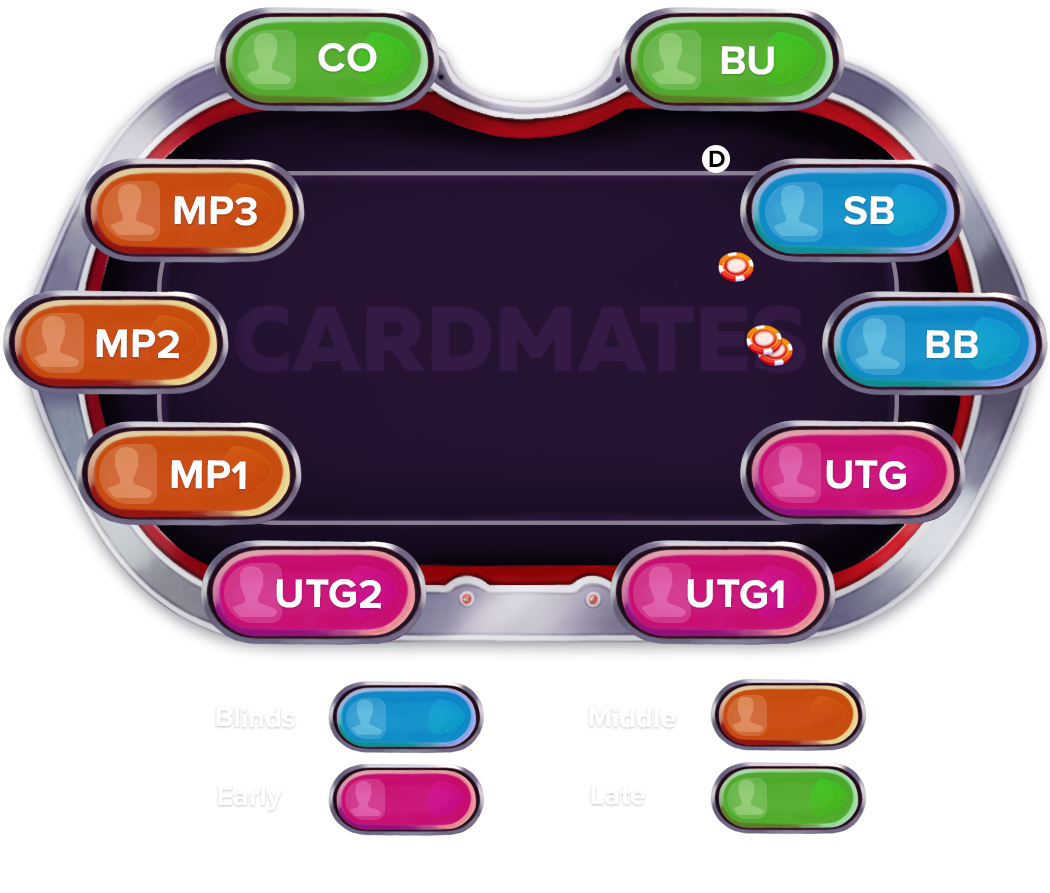

A dealer (otherwise known as a button, BU or BTN) is thought to hold the most favourable position. This player is the last one who bets, calls, or makes any other move on each betting round, being aware of what moves other participants took. BTN receives a special chip with the letter "D" (or inscription "Dealer") on it. When the next match starts, this chip shifts one seat to the left. So, all players have a chance to be the dealer. It works the same way in online and offline casinos, where the professional croupier deals the cards.
Types of Available Actions
Bets serve the purpose of forming a pot, which is every single participant's "prey". They are categorized as mandatory and voluntary.
In the first scenario, two players sitting to the dealer’s left are required to place so-called “blind bets” (in a predetermined amount) – these are small and big blinds, online often abbreviated as SB and BB. Usually big blind is twice as big as small blind. For example, if SB bets 50 cents, then BB should pay 1 dollar (this is the minimum bet in this game). Once the blinds (or their alternative “ante”) are posted, pocket cards are dealt.
Blinds remain static only in cash games, blinds are static. But they raise with 10-15 minute intervals in multi-table tournaments. Also, the blinds increase may occur after a certain number of hands.
To join the action, the next participant needs to post an amount matching BB or raise it. If SB wants to continue to fight for the pot, they must add the required number of chips. But, the first word will be up to them on all subsequent streets.
According to texas hold em rules, users can decide between the following options:
| Action | Explanation |
|---|---|
| Bet | Making the initial bet during a single round. |
| Call | Agreeing with the previously placed bet. |
| Raise | Boosting the prior wager. |
| Check | Skipping the turn. You let the next player to make a decision, whilst you’re in the game without any additional bet. This move is only possible when no one raised the bet in this round. |
| Fold | Declining further betting, that is, from participation in the current hand. You lose all the chips placed up to that moment. |
| All-in, shoving | The one who chooses this option adds all their chips to the pot. Failing, they lose everything or a specific amount. In case of triumph, they take the pot. |
Card Combinations in Texas Hold 'Em
A poker hand is a qualifying set consisting of 5 cards: starting ones and board. The higher its rank, the more difficult it is to form. Understanding the exact hierarchy of combinations is essential to succeed in poker. Here are all the possible hands you can collect within the game:
- High card – a situation where a person has not composed any combo. The five highest rank elements count.
- Pair – occurs when the player has two same rank cards with 3 random ones: K-K-7-8-J.
- Two Pair – this hand involves and combines two different pairs plus 1 random card. For instance, J-J-Q-Q-9.
- 3 of a kind* – if the face-up and community cards have three options with the same rank, the hand is considered a triple: A-A-A-T-8.
- Straight – a 5-card combo where elements are organised in sequential order. E.g. 6-7-8-9-T.
- Flush – a combination of 5 suited cards where no one has an identical rank. Say, it’s 8♥-Q♥-T♥-5♥-A♥.
- Full House** – a combination that combines a pair and 3 of a kind into a new set. For example, A-A-A-8-8.
- 4 of a kind/ Quads – it’s also known as quads, where 4 cards of the identical value and any other card for a combination: 6-6-6-6-7.
- Straight flush – a set of 5 suited cards where each next element is one rank higher than the previous. For instance, 6♣-7♣- 8♣-9♣-10♣.
- Royal flush*** – represents 5 consecutive & suited cards. Note that there is only one option to form this hand: T-J-Q-K-A.

* The hand exists in two variations: set and trips. In the first case, a pocket pair and one community card are required. The second scenario involves a pair on the board + one hole card.
** If two rivals have a full house, the one with the stronger triplet wins.
*** The mightiest hand ever. And it is also the rarest one – you can spend your entire life playing TH but never hit a royal flush.
Full NLH 3-Max Hand Example
How do you play Texas Holdem? Our experts can break down the four betting rounds step by step. We took NLH 10/20 cash table as an example.
Number of players: 3.
Hero is seated on BB with J♠-A♦.

Gamblers on the blinds place their bets. In our case, these are 10 and 20 chips, respectively. Then, all participants receive two pocket cards.
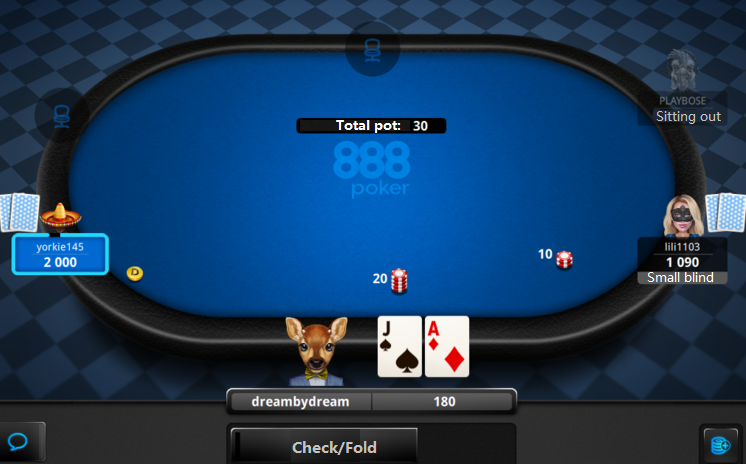
The initial stage of betting kicks off: UTG player performs first; the last to act are SB and BB.

Before the stage starts, the dealer lays 3 face-up cards at the table. At this moment, players analyse their own and community cards to understand whether they’ll have any combination.
SB goes first, followed by BB and so on clockwise.
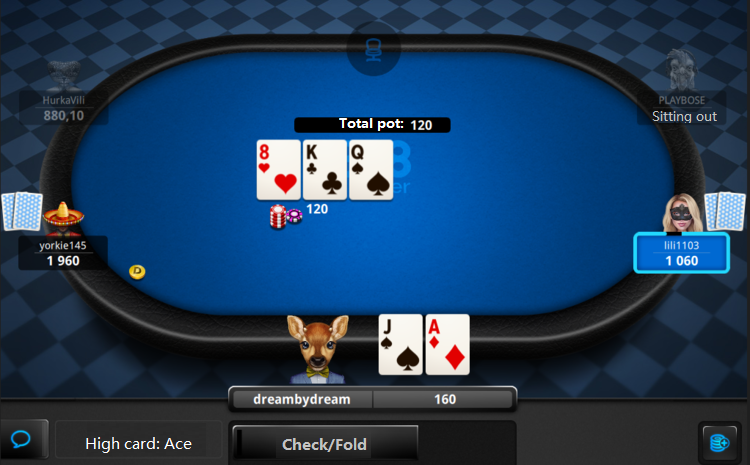

The fourth shared card (turn) is added to the table. Betting proceeds according to the previous scenario.
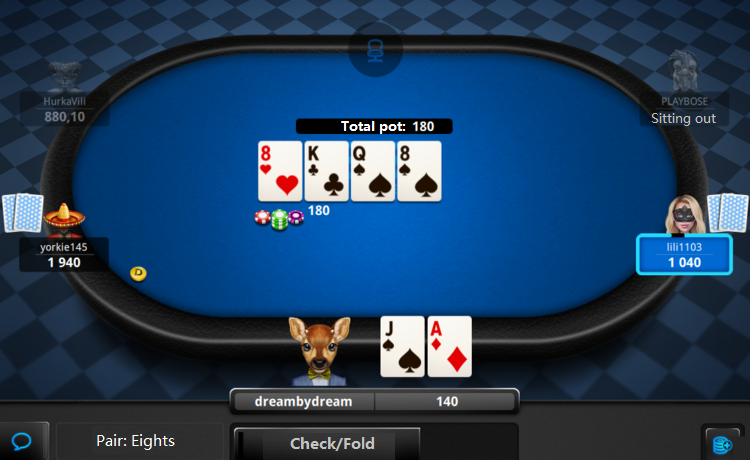

The next-to-last stage is the river, that’s when the fifth and final board element shows up. Action rules remain the same. If more than one person is left in the race after the auction ends, the culmination point (showdown) comes down, marking a winner's determination.
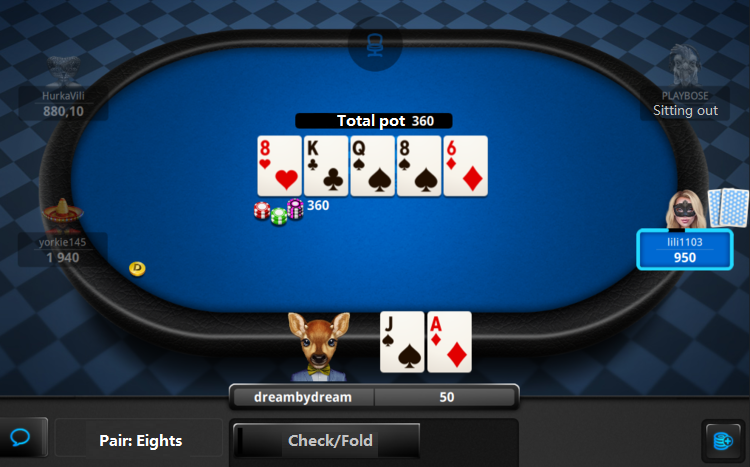
How to Determine a Champion
This is when the players analyse the combinations, and the strongest hand gets the pot. Offline, the river betting initiator is the first to reveal their cards, followed by others clockwise. However, gamblers may choose to show their hands "out of turn" if they wish.
When playing online games, a showdown is executed by a computer. The system automatically turns all participants’ cards over and compares them, giving an immediate result.
In our case, both finalists collected a pair of eights, but Hero’s ace kicker secures them victory.
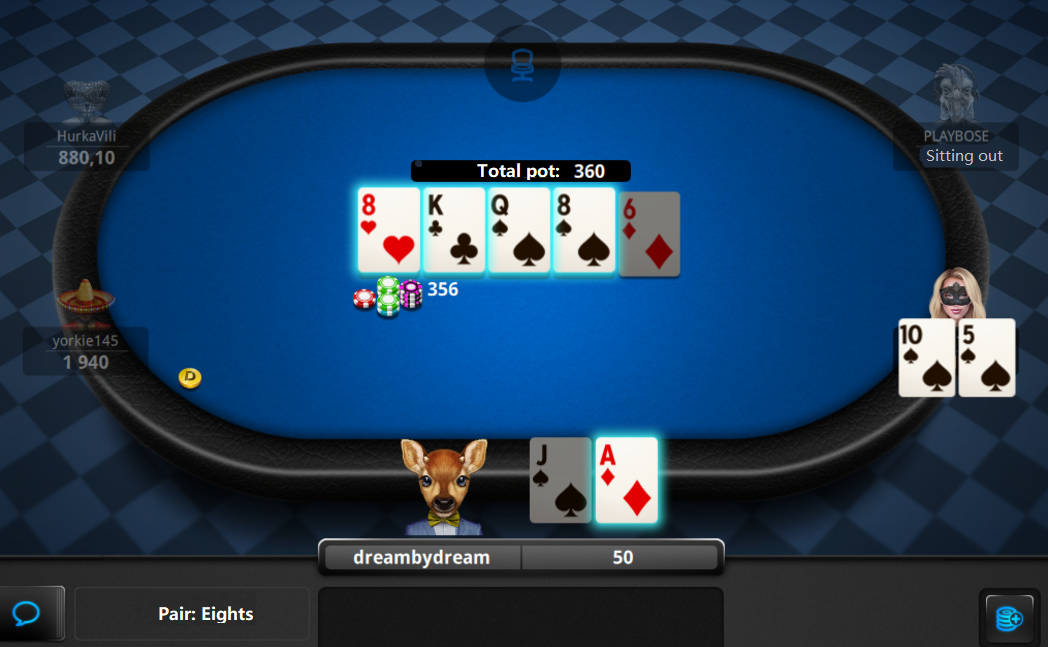
At this point, the match ends and a new one begins, with the blinds and dealer button shifting rightward.

Unlike cash tables, MTT users strive to win an event. To do this, you need to reach the ITM stage (aka prize zone). If you leave the competition before it starts – on the bubble or earlier – you will receive no rewards. However, the gameplay and betting rules remain unchanged.
#Ad 18+ Full T&C apply. BeGambleAware. First time depositors only. Min deposit $10. Select 'Match Bonus' in cashier. Max bonus $600. Bonus released in $1 increment per $5 paid in net rake/tournament fees. 90 days after eligible first deposit to unlock full bonus. Withdrawal restrictions apply.
#Ad 18+ Full T&C apply. BeGambleAware. UK first depositors only. Min. deposit: $10. Bonus will be granted as tournament tickets gradually over 6 days and will expire after 24 hours. Full T&C apply
#Ad 18+ Full T&C apply. BeGambleAware.org. First time depositors only. Min. deposit £10 with code 'STARS400'. Play on any real money table on the site within 120 days after making eligible deposit. Bonus released in £5 instalments every 100 redemption points. No withdrawal during bonus period. Please play responsibly.
Final Thoughts
The Internet, movies, live broadcasts of cash games and MTTs have made Texas Holdem poker rules most prevalent on the planet. Any newbie is able to quickly grasp the game's nuances. Rules are clear, although it takes immense dedication and effort to transform into a skilled professional.
There are three variations: limit, no limit, and pot limit. They only differ in terms of the betting structure. Positions, combinations, possible actions, rounds, and other aspects remain consistent across all forms. Looking for more exotic alternatives? You might like Badugi and Chinese poker. For detailed information, visit our website's Poker School section.
FAQ
🎉 How difficult is it to learn how to play Texas Hold’em poker?
One can obtain a basic game mastery in just a few hours. To fully understand the gameplay, of course, one will have to practice regularly. To start, the standard card deck is required. One Hold’em table can accommodate two to ten gamblers.
In each round, players can either exit the game or continue compationg for the accumulated pot. For newbies, it's paramount to understand poker hands: their ranking and forming rules. All relevant information is available on our website. We recommend that you start by playing for virtual credits, then test your skills in freerolls and don’t rush to real money bets.
📌 How does a game of Texas Holdem work?
One hand has 4 rounds or "streets" of betting. Throughout these phases, gamblers form a common pot, which will ultimately be awarded to one or several winners. The action here begins with obligatory bets, known as blinds. The next stage is when participants get hole cards. After that, players bet throughout flop, turn and river, trying to grab the pot. When the last card appears on the table, it is a showdown. All participants demonstrate their pockets to determine the victor.
🃏 How many cards do you flip in Texas Holdem?
Each individual makes use of their two own and five face-up cards that appear on the table during the hand. Once a dealer is determined, gamblers receive their starters. Afterwards, 4 betting stages start, during which visible cards are laid out, forming a "board", and bets are placed. These are flop (3 cards), turn (1 card), and river (1 card)
🏆 What wins in Texas Hold'Em?
The best existing five-card combo ultimately wins on showdown, To complete it, one can combine board pieces along with their personal holdings. Note that pocket cards can be utilised in full, partially, or not used at all.
There are 10 sets of hands in total, with the Royal Flush being an unbeatable combination. The suit factor is not taken into account here. If there are two identical hands at the table, each player gets half of the accumulated pot.





Texas Hold'em is a captivating game that combines both skill and luck, making it a favorite among poker enthusiasts worldwide. The rich history and evolving strategies keep the game fresh, even for seasoned players. Whether you're just learning the basics or aiming to become a pro like Daniel Negreanu or Phil Hellmuth, mastering Texas Hold'em offers endless entertainment and challenge. The game's widespread popularity, fueled by online platforms and media, has made it accessible to everyone, regardless of background. So, dive in, study the rules, and start your poker journey today
Please, login or register.